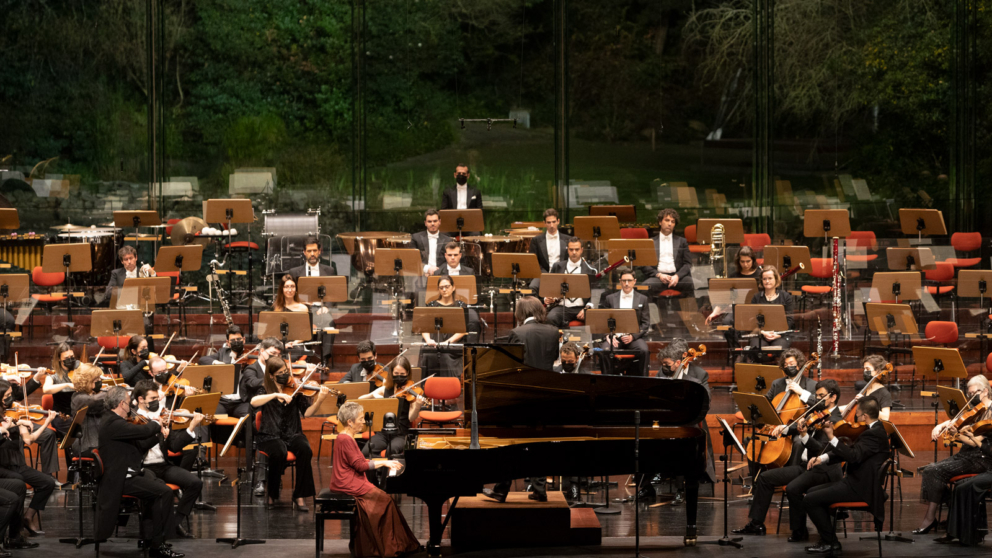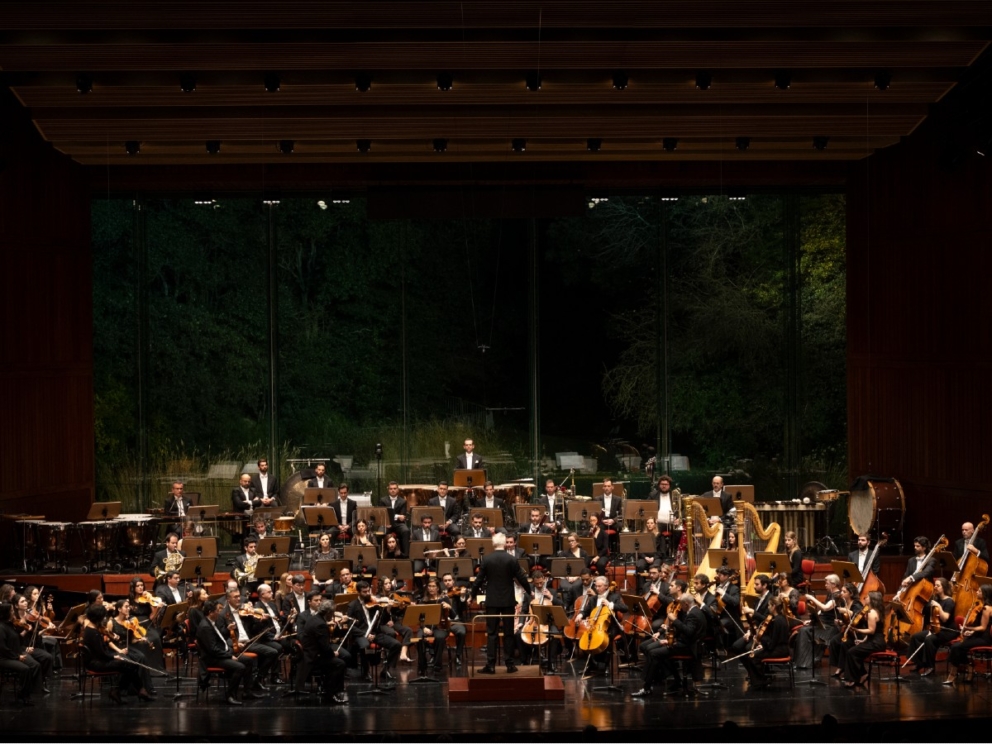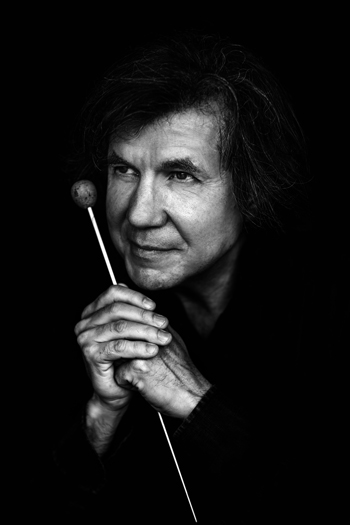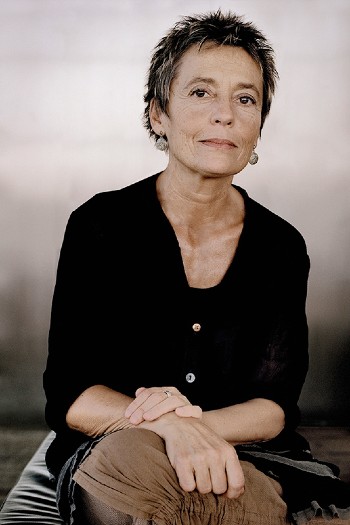Chopin: Piano Concerto No. 2
Gulbenkian Orchestra / Ricardo Castro / Maria João Pires

Performers
- Conductor
- Piano
-

Gulbenkian Orchestra
In 1962, the Calouste Gulbenkian Foundation decided to establish a permanent orchestral ensemble. Originally with only twelve musicians (strings and continuo) it was named “Orquestra de Câmara Gulbenkian”. This collective was successively enlarged and today the “Orquestra Gulbenkian” (the name it has adopted since 1971) has a permanent body of sixty instrumentalists, a number that can be expanded depending on the repertoire.
This structure allows the Gulbenkian Orchestra to interpret works from the Baroque and Classical periods, a significant part of 19th century orchestral literature and much of the music of the 20th century, including works belonging to the current repertoire of the traditional symphonic orchestras. In each season, the orchestra performs on a regular series of concerts at the Gulbenkian Grand Auditorium in Lisbon, where it has had the opportunity of working together with some of leading names of the world of music (conductors and soloists). It has also performed on numerous locations all over Portugal, in an effort to decentralize music and culture.
The orchestra has been constantly expanding its activities in the international level, performing in Europe, Asia Africa, and the Americas. In the recording field, Orquestra Gulbenkian is associated to labels as Philips, Deutsche Grammophon, Hyperion, Teldec, Erato, Adès, Nimbus, Lyrinx, Naïve and Pentatone, among others, and this activity was recognized with several international prizes.
-

Ricardo Castro
Piano
In 1993 Ricardo Castro received the first prize at the prestigious Leeds International Piano Competition in England, becoming the unique Latin American to win the competition since its foundation. 20 years later, he became the first Brazilian to receive the Honorary Membership from the Royal Philharmonic Society. The nomination put him alongside illustrious personalities in the history of Western music.
Born in Brazil, Ricardo Castro revealed a clear interest and ease to play the piano at the age of three, listening his older sister’s classes with their aunt. At the age of five, drawing the attention of Esther Cardoso, a Marguerite Long fellow, he was exceptionally accepted to join the School of Music and Performing Arts of the Federal University of Bahia. Several public appearances followed immediately and at the age of 10 he performed as soloist the Haydn’s Piano Concerto in D Major.
In 1984 Ricardo Castro began his musical studies in Europe, joining the Superior Conservatory of Music in Geneva in the virtuoso class of Maria Tipo and the conducting class of Arpad Gerecz. He won first prizes both at Zurich’s Rahn Competition, in 1985, and Bern’s Pembaur Contest, in 1986, before graduating from the Geneva Conservatory in 1987 with the “Premier Prix de Virtuosité avec Distinction et Félicitations du Jury”. That same year, he was the ex-aequo winner of the ARD International Competition in Munich and in 1988 he was prize winner at Geza Anda Competition. Shortly after he completed his piano studies in Paris with Dominique Merlet.
Considered a "Marketing Dream" by the British press after winning the Leeds Competition, he was invited to concerts with major orchestras such as the Gewandhaus of Leipzig, Tonhalle Zurich, BBC London Philharmonic, English Chamber Orchestra, Academy of St. Martin in the Fields, City of Birmingham Symphony, Tokyo Philharmonic, Orchestre de la Suisse Romande, the Mozarteum of Salzburg and many others. Among his partners are Sir Simon Rattle, Martha Argerich, Leif Segerstam, Kazimierz Kord, Midori and Antonio Meneses.
In 2003, he started a piano duo with Maria João Pires, performing a series of recitals throughout Europe. In 2005 a CD of the duo was released by the Deutsche Grammophon, with solo and four-hands works by Franz Schubert. He recorded several other CDs for the label BMG-Arte Nova, all of which were acclaimed by specialized critics.
In 2007, by invitation of the Government of the State of Bahia, Castro created NEOJIBA (State Centers for Youth and Children Orchestras of Bahia), a pioneering program in Brazil inspired by El Sistema in Venezuela that has benefited more than 10.000 children, adolescents and young people in Bahia. General director at NEOJIBA, Ricardo Castro is also Principal Conductor and Artistic Director of the Youth Orchestra of Bahia, the first Brazilian youth orchestra to perform in Europe. Since its foundation, the orchestra has done hundreds of concerts in Brazil and realized seven international tours in the most prestigious concert halls in Europe and USA.
In September 2020 Ricardo Castro was nominated professor at the prestigious Haute École de Musique de Genève, where he will act as head of the keyboard department from September 2021. He also teaches piano at the Haute École de Musique Vaud Valais Fribourg in Switzerland and at the Scuola di Musica di Fiesole, in Italy, where in 2018 he created a course for “Conducting from the keyboard”.
-

Maria João Pires
Piano
Born on 23 July 1944 in Lisbon, Maria João Pires gave her first public performance at the age of 4 and began her studies of music and piano with Campos Coelho and Francine Benoît, continuing later in Germany, with Rosl Schmid and Karl Engel. In addition to her concerts, she has made recordings for Erato for fifteen years and Deutsche Grammophon for twenty years.
Since the 1970s, she has devoted herself to reflecting the influence of art in life, community and education, trying to discover new ways of establishing this way of thinking in society. She has searched for new ways which, respecting the development of individuals and cultures, encourage the sharing of ideas.
In 1999, she created the Centre for the Belgais Centre for the Study of the Arts in Portugal. Maria João Pires regularly offers interdisciplinary workshops for professional musicians and music lovers. In the Belgais concert hall concerts and recordings regularly take place. In future these will be shared with the international digital community (pay and non-pay).
In 2012, in Belgium, she initiated two complementary projects; the Partitura Choirs, a project which creates and develops choirs for children from disadvantaged backgrounds as in Belgium the „Hesperos Choir, and the Partitura Workshops. All of the Partitura projects have the aim to create an altruistic dynamic between artists of different generations by proposing an alternative in a world too often focused on competitiveness. This philosophy is being spread worldwide at Partitura projects and workshops.
Programme
Fryderyk Chopin
Concerto for Piano n.º 2, in F minor, op. 21
1. Maestoso
2. Larghetto
3. Allegro vivace